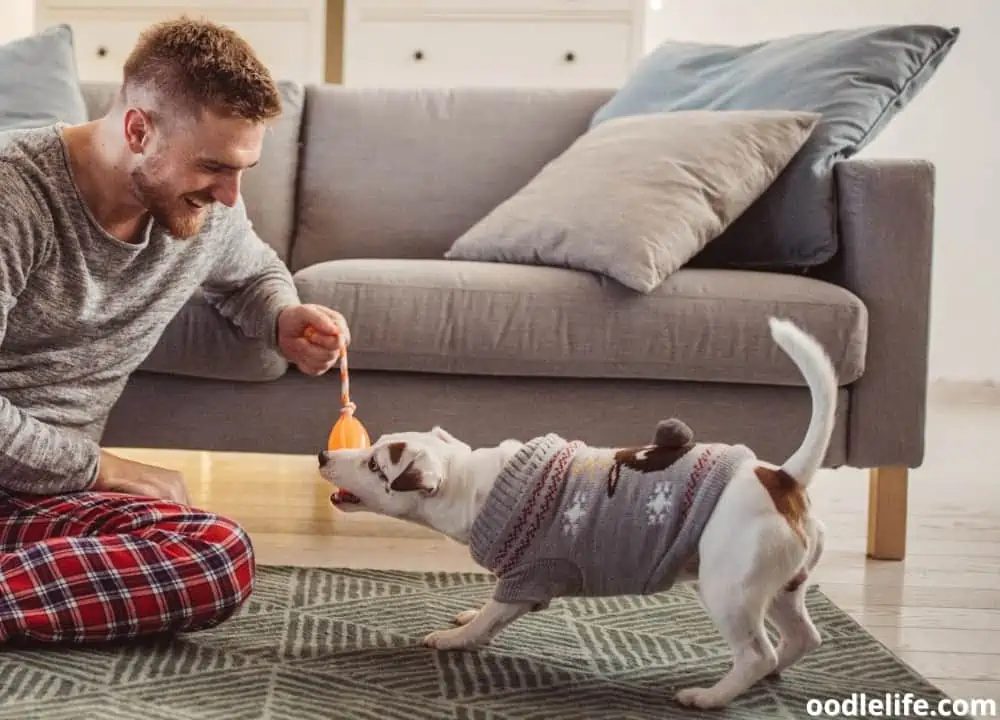Why Do Dogs Destroy Their Beds? [5 Reasons]
Dogs have many unusual behaviors. Some can be sweet, others are funny, but some, like destroying their beds, are irritating.
We’ll break down some of the most common reasons why dogs destroy their beds and offer solutions to help you curb this canine habit.

Why Do Dogs Destroy Their Beds?
There are a variety of reasons dogs destroy their beds.
New Beds Are Stressful
Surprising as it sounds, buying a new bed for your dog can be stressful. Dogs have keen noses and rely heavily on smells to feel safe in their environment.
In particular, dogs use pheromones to mark or claim their territory. Dogs release pheromones through:
- Facial scent glands
- Anal glands
- Urine
- Saliva
Typically, dogs won’t soil their bed. Consequently, many canines revert to munching on their bed, whether it’s made of Kevlar thread, memory foam, or suede.
Their saliva releases pheromones, and the bed smells appropriately doggy in no time. But what the newly dog-scented bed gains in pheromones, it lacks in aesthetics.
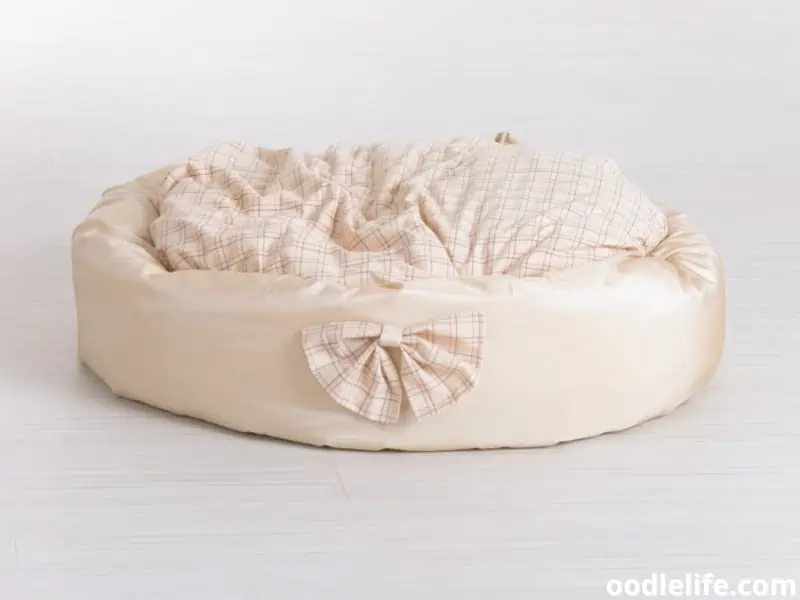
Digging and Chewing Is Instinctive
Another answer to ‘Why do dogs destroy their beds’ is that it’s instinctual.
Before we domesticated them, dogs were hunters. It’s natural for dogs to want to rip, shred and tear everything from their bed to your sofa.
But while these behaviors are instinctual, it’s also worth considering that some dog breeds are naturally more destructive than others. For instance, because they were bred as ratters, Terriers reflexively shake and rip their prey.
Likewise, Dachshunds are dogs that are deceptively aggressive chewers. Give them a toy with a squeaker, and their instinct is to rip the squeaky heart out of it. Sometimes, that prey instinct extends to a new bed.
This is especially true for dogs who dig compulsively, like:
- Dachshunds
- Siberian Huskies
- Cairn Terriers
- Malamutes
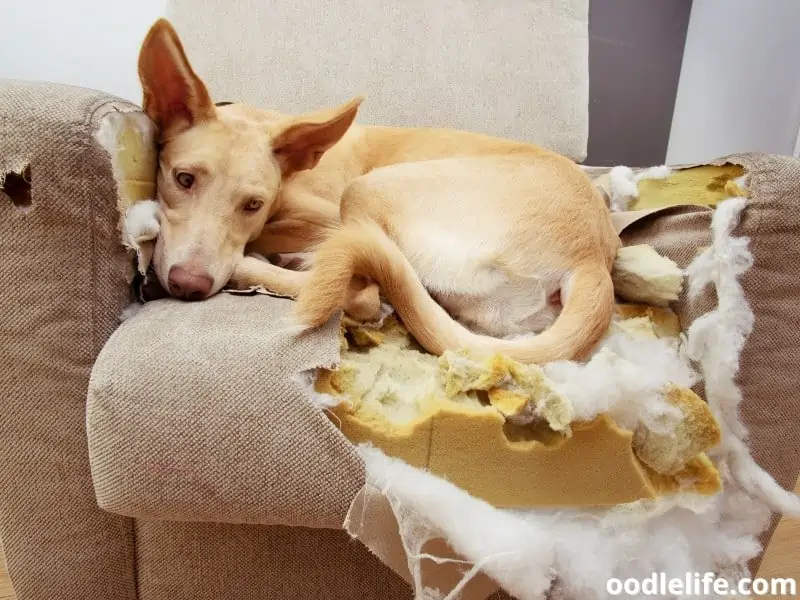
A Bored Dog Is A Destructive Dog
Another reason why dogs destroy their beds is out of boredom.
While some dogs can sleep all day, others require lots of intellectual stimulation to keep themselves entertained.
Without adequate environmental enrichment, a bored dog may:
- Eliminate inappropriately
- Chew carpet/furniture
- Chew/eat fur
- Groom compulsively
None of these behaviors should be encouraged. But in the case of a dog that destroys their bed, the habit is an expensive one and needs curbing.
Boredom isn’t just about toys, either. Although independent play is important, so are walks. It’s possible that an under-exercised dog will become bored and start destroying their bed to keep things interesting.
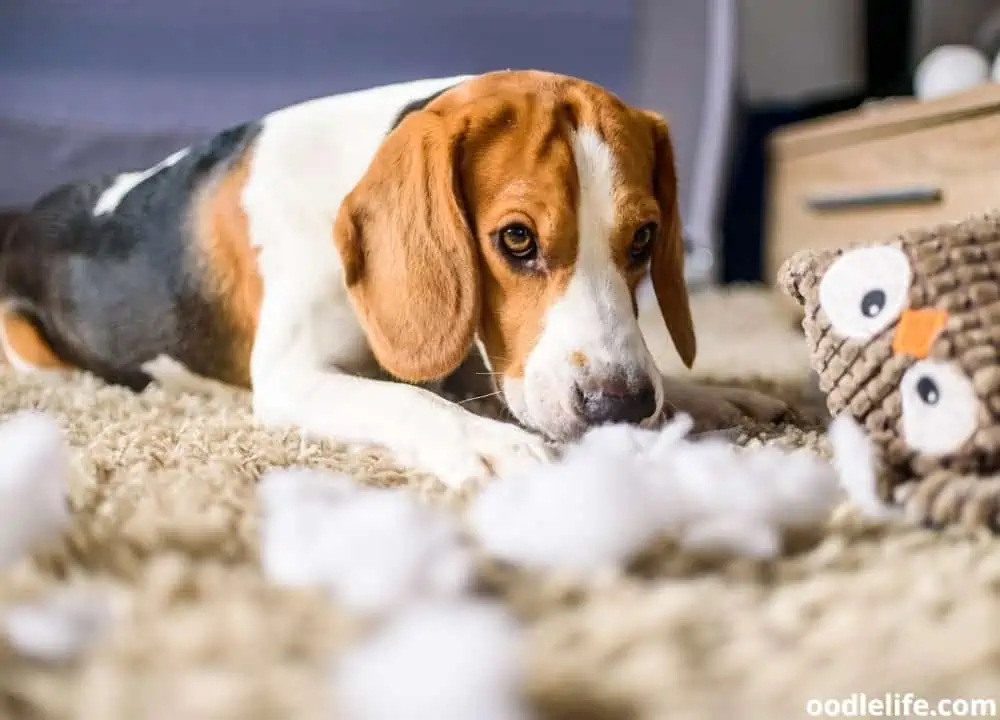
Canine Separation Anxiety
From the human perspective, destructive chewing, especially of a new dog bed, can feel deliberate and even malicious. But that’s rarely the case.
Another reason why some dogs chew their beds is a side effect of canine separation anxiety. While scientists debate how and if dogs process emotions, one thing they agree on is that dogs, like people, can and do experience anxiety.
Separation anxiety in dogs is often the result of a significant change in your dog’s life. Causes include:
- Loss of a family member
- New family member
- Moving house
- Change in routine
A certain amount of separation anxiety can be normal, especially for a newly-rescued dog. But it can also develop in a dog you’ve had for years if you move house or another pet dies.
Symptoms of separation anxiety include:
- Whining
- Pacing/circling by door
- Inappropriate elimination
- Destructive chewing
- Depression/withdrawal
It’s not uncommon to see a combination of these last two symptoms in a dog with separation anxiety. They may retreat to their bed seeking safety, and munch or chew the bed and blankets to mitigate some of their anxiety.
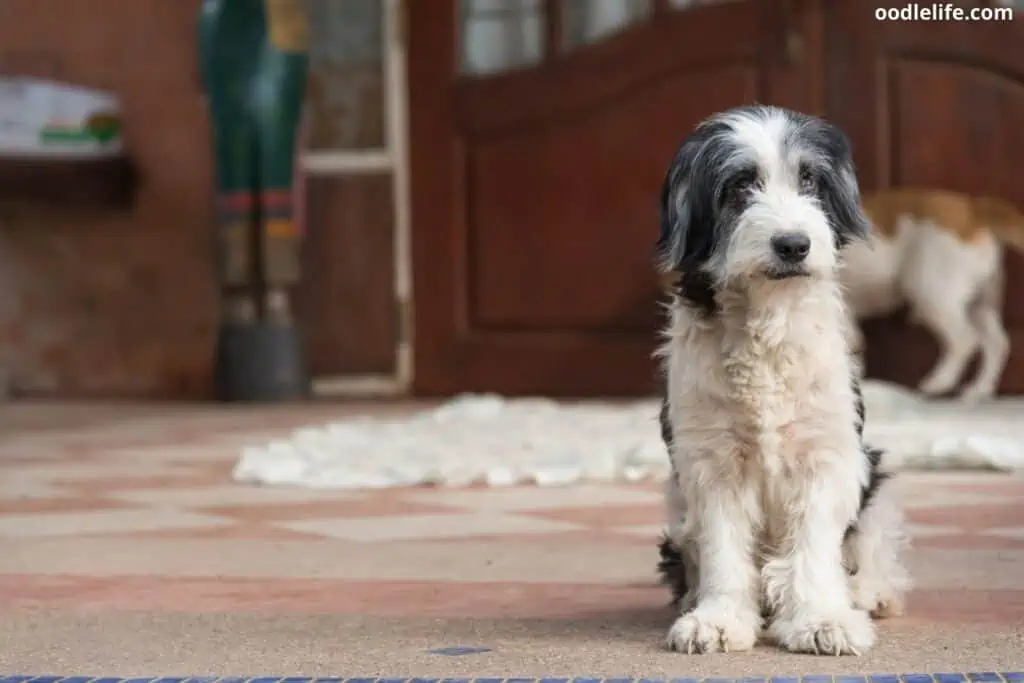
Teething Trouble
Sometimes the reason why dogs destroy their beds comes down to age. Some dogs are indeed more aggressive chewers than others.
But it’s also true that teething puppies are infamous for chewing everything and anything. That includes their beds.
Puppies start teething at approximately three weeks old, and they continue teething until they reach at least six months.
There’s no hard and fast rule on how long teething lasts. But one undeniably true thing is that it is extremely uncomfortable for the teething puppy. To cope with the discomfort of their incoming adult teeth, puppies chew everything from antique tables to their beds.
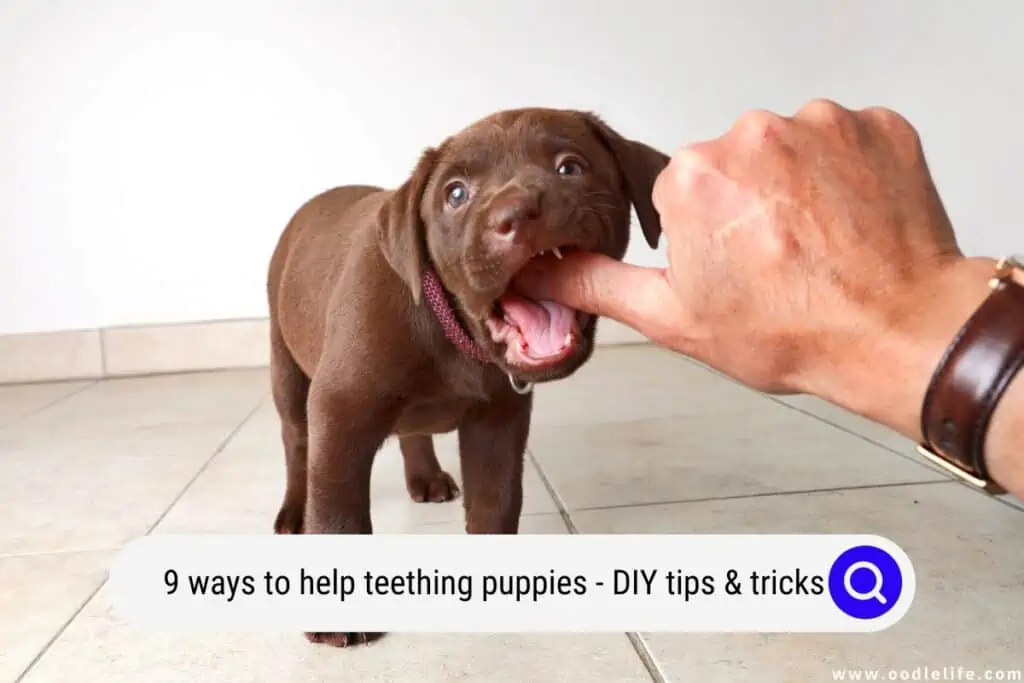
Inadequate Chew Toys
However, if it’s your adult dog destroying their bed, then the situation is slightly different.
We’ve talked about boredom and aggressive chewing. Crucially, you need to remember that aggressive chewing doesn’t mean a dog is naturally aggressive.
But it does mean that instinct to slaughter a cuddly toy and an inability to cope with boredom pair extremely badly in certain dog breeds.
A naturally aggressive chewer destroys soft toys faster than a soft-jawed dog, like a Retriever or Labrador. That means you have to carefully consider the type of toys you buy for your dog.
Not all chew toys are created equal, and if you leave your dog with a toy they chew through in minutes, they may spend the rest of the day destroying the bed.
Not only that, but if the chew toy includes a squeaker and you aren’t there to supervise, you risk a choking hazard. It’s never preferable for the dog to chew the bed, but if your choices are between the bed and the dog, one is significantly more replaceable.
Pica and Other Health Issues
Finally, one of the reasons why dogs destroy their beds concerns their health.
While it’s not the case for every dog, some dogs develop pica, a disorder where they compulsively eat non-edible things, like dog beds and carpets.
Dogs with pica may suffer other health conditions, like intestinal blockages, depending on how much they eat and just how inappropriate the thing consumed is.
Importantly, pica isn’t the only health condition that causes dogs to destroy their bed. Various oral illnesses may trigger this behavior, especially mouth ulcers. That’s because one way to alleviate the discomfort of the ulcer is by chewing on the bed.
The sensation distracts your dog from the ulcer pain but destroys their bed in the process.
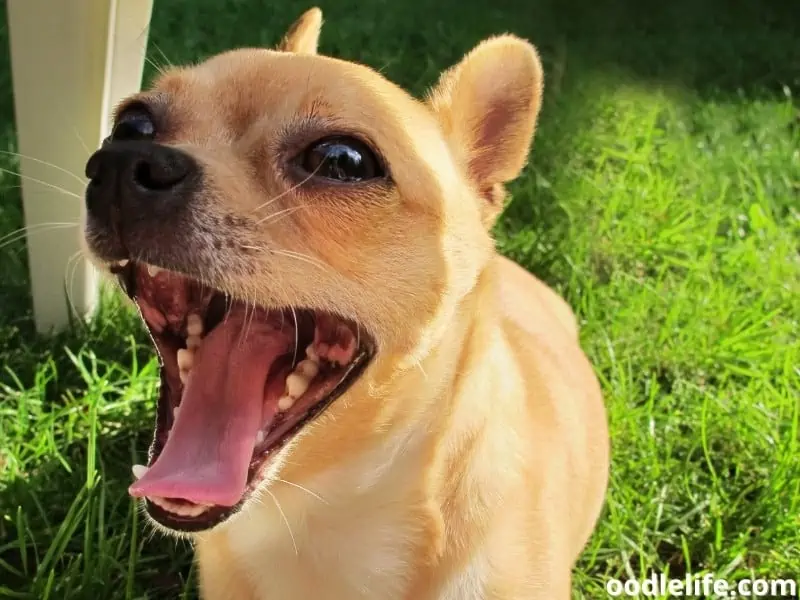
How To Stop Dogs from Destroying Their Beds?
So, how do you stop a dog from destroying their bed? There are various solutions, and many of them depend on the cause of the destructive chewing.
Solution of Bitter Apple or Lime
There are some tastes dogs can’t stand, and bitter apple and lime are among them. Spray a bit on the dog bed and it should discourage further chewing.
However, you can’t expect an immediate halt to inappropriate chewing. It may take two or three applications before your dog desists completely. That said, we have a pair of Dachshunds who would eat us out of house and home if it were possible, and we swear by bitter apples.
It takes patience, but it’s effective.
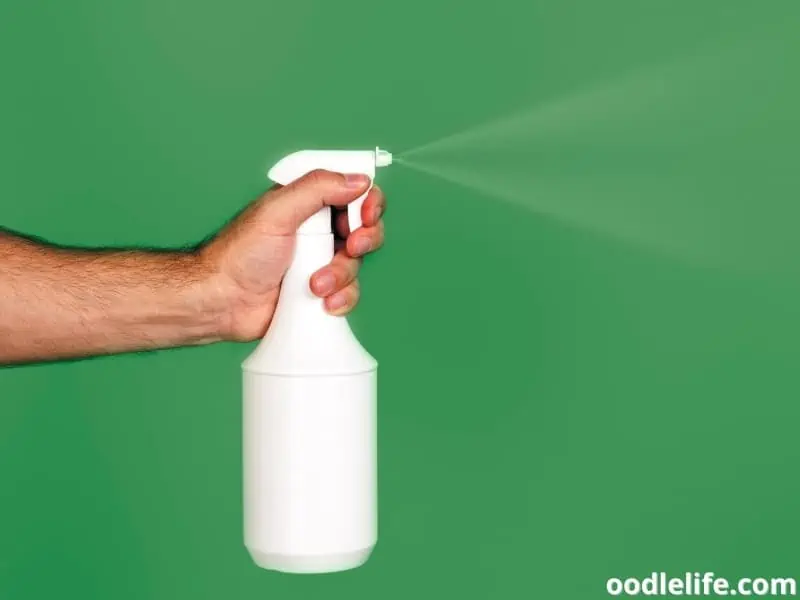
Pheromone Therapy
Another solution to the problem of why dogs destroy their beds is synthetic pheromones.
These are excellent ways to treat:
- Stress
- Separation anxiety
The pheromone dispenser releases synthetic pheromones that relax your dog by convincing them they have marked more of the room or bed than is the case.
If you’ve recently bought your dog a new bed, these can be extremely helpful, because they help persuade your dog that their bed is not only safe but already smells of them.
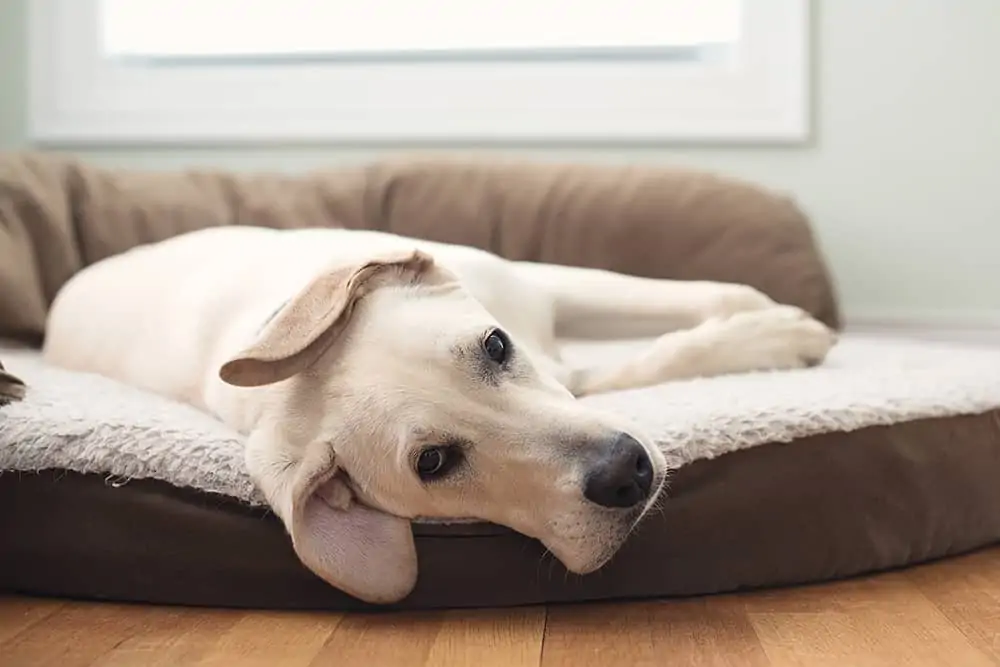
Environmental Enrichment
If the reason why your dog destroys their bed stems from boredom, then environmental enrichment may help solve the problem.
Environmental enrichment encompasses a variety of activities designed to increase canine stimulation and decrease the need for destructive chewing. Examples include:
- Puzzle toys
- Long walks
- Games of fetch
While some enrichment can include independent play for your dog, exercise is another way to enrich their environment. It has the additional bonus of ensuring your dog is sufficiently tired post-walk that they won’t want to chew their bed.
If you aren’t able to factor long walks into the day, it may be worth investing in a dog walker or arranging with a neighbor or family friend to take your dog walking regularly.
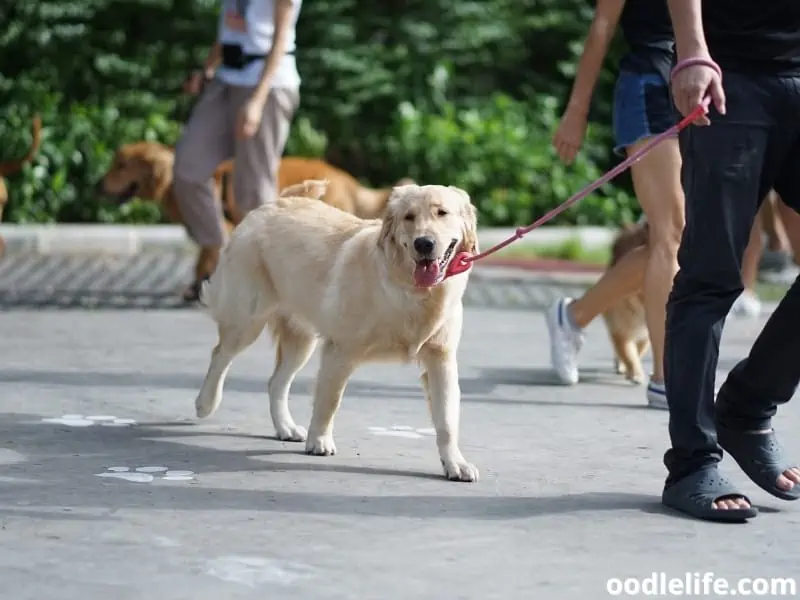
Durable Chew Toys
Lastly, invest in durable chew toys. One reason dogs start destroying their beds is that they have exhausted all other forms of entertainment.
And while chew toys are less expensive than beds, you may find yourself replacing them every couple of days depending on how much wear and tear they get.
By buying chew toys with a durability that matches your dog’s enthusiasm for playing, you’ll avoid the kind of destructive behavior that leads to eviscerated dog beds.
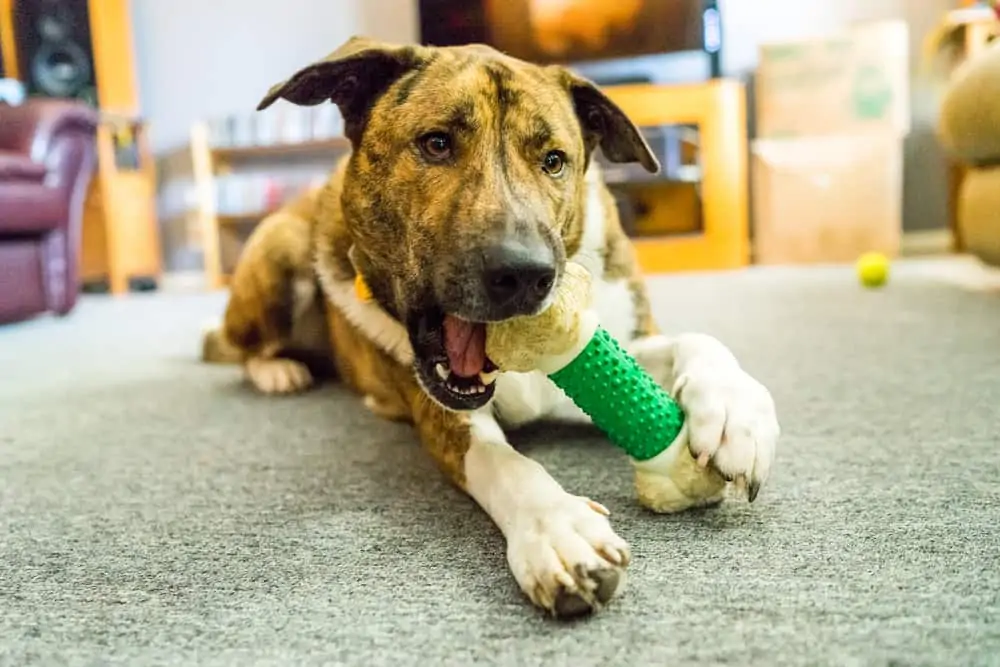
Final Thoughts
Why do dogs destroy their beds?
Like people, dogs have personalities. Accordingly, the reasons behind why they act the way they do vary from dog to dog. They may chew their bed to manage a health problem, alleviate boredom or mitigate anxiety.
Depending on the age of the dog, they may even outgrow the behavior when their adult teeth come in.
Whatever the cause, dogs don’t destroy their beds out of malice. So take time to assess your dog’s emotional and physical health, and stock up on durable chew toys. With a bit of time and effort, you should see a change in their behavior.
